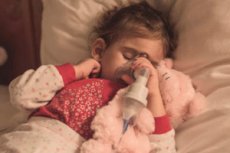Medical expert of the article
New publications
Why does the baby cough at night and what to do?
Last reviewed: 29.06.2025

All iLive content is medically reviewed or fact checked to ensure as much factual accuracy as possible.
We have strict sourcing guidelines and only link to reputable media sites, academic research institutions and, whenever possible, medically peer reviewed studies. Note that the numbers in parentheses ([1], [2], etc.) are clickable links to these studies.
If you feel that any of our content is inaccurate, out-of-date, or otherwise questionable, please select it and press Ctrl + Enter.

Why does a child cough at night and what to do? In most cases, children cough when respiratory infections affect the upper respiratory tract, bronchi and lungs. It often happens that the child coughs at night, and during the day the cough almost does not bother him. But this makes parents worry. So why do children cough at night and how to treat it?
Causes of the a baby's nighttime cough
Coughing is an important defense reflex that ensures the removal of mucus, harmful substances and irritants from the larynx, trachea and bronchi; in many children, coughing increases at night. Night cough can have different causes, and, first of all, it is caused by acute respiratory infections and ARVI to ataral-respiratory syndrome, in which mucus from the nose and paranasal sinuses can flow into the throat (which is defined in otolaryngology as postnasal congestion), causing coughing during sleep. This syndrome is also characteristic of enlargement of the nasopharyngeal tonsils - adenoids - and their inflammation - adenoiditis in children. In addition, many children with this disease have a stuffy nose, and they have to breathe through the mouth, and when cold and dry air enters the lungs, not warmed and not cleared of dust particles (as in nasal breathing), which increases the night cough.
When a child coughs heavily at night with a dry cough, the most likely cause is acute laryngitis (false croup) in children - an acute inflammation of the larynx, the most common causative agent of which is Respirovirus HPIV-1 and HPIV-3 (human parainfluenza virus) and HRSV (respiratory syncytial virus of the Pneumoviridae family). In addition to coughing, symptoms of false croup include fever, hoarse voice, wheezing, and inspiratory stridor (wheezing).
If a child coughs at night to the point of vomiting, he or she likely has the catarrhal stage of pertussis, caused by the bacteria Bordetella pertussis), tracheitis, or allergic tracheobronchitis.
The presence of respiratory allergies also leads to the coughing variant of bronchial asthma in children, which is characterized by inflammation and obstruction of the airways due to their increased reaction to irritants, causing the child to cough and suffocate at night.
With acid reflux and gastroesophageal reflux disease (GERD) most often the child coughs at night, but not during the day.
In cases of pulmonary syndrome in such type of worm infestation as ascariasis in children, the child coughs all night. In addition to night coughing (which may be dry or accompanied by sputum discharge), in transient (temporary) hyperplasia of the thymus (thymus gland), there may be a feeling of discomfort in the chest, wheezing and shortness of breath.
Risk factors
The risk factors for night cough in children include: decreased immunity and frequent respiratory diseases; hypersensitivity of the respiratory tract (sensitization) to allergens of exogenous and endogenous origin; overweight (which increases the likelihood of asthma symptoms at night); in the presence of GERD - eating before bedtime.
Increased nighttime coughing in children can be caused by low indoor temperatures and dry air.
Pathogenesis
Cough appears reflexively as an immune response to the action of viral or bacterial toxins on the receptors of the mucosal epithelium. Its pathogenesis in respiratory infections of viral or bacterial origin, as well as in allergic reactions, is described in detail in publications:
In acute laryngitis, horizontal position increases the swelling of the submucosa of the larynx, so coughing attacks increase at night.
In the case of ascariasis, coughing occurs due to the migration of the larvae of this helminth from the intestine to the respiratory tract, for more information see. - pulmonary eosinophilia
And with GERD, the child coughs at night due to irritation of the mucosa of the respiratory tract by the acidic contents of the stomach and duodenum.
Complications and consequences
A serious complication of bouts of intense coughing at night can be a disturbance in the rhythm of breathing with impaired lung ventilation and lack of oxygen (hypoxia).
Diagnostics of the a baby's nighttime cough
Pediatricians diagnose a cold in children (acute respiratory infections or ARI) by the presence of its symptoms.
In other cases, tests are taken: general and biochemical blood tests, for antibodies to B. Pertussis, for eosinophils and specific immunoglobulins IgE, enzyme immunoassay for antigens; sputum analysis; fecal analysis for helminth eggs.
Basic instrumental diagnosis includes laryngoscopy, laryngeal and pharyngeal x-ray, and chest x-ray.
Differential diagnosis should distinguish infectious causes of cough from cough of other etiologies. Read more:
Who to contact?
Treatment of the a baby's nighttime cough
To rid the child of night cough, its origin must be considered, so etiologic treatment is necessary, more:
Prevention
To prevent pertussis (or at least alleviate its symptoms), vaccinations are given, and personal hygiene must be practiced to prevent helminths from entering the child's body. It is also possible to prevent upper respiratory tract infections in children.
Использованная литература

